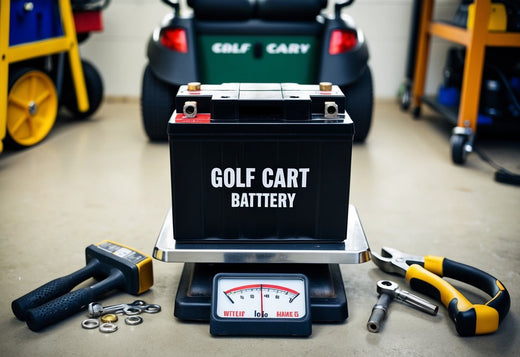Check out our golf rangefinders by Vovex to elevate your game!
Golf cart batteries are a crucial component of these popular vehicles, powering them across courses and communities. A typical golf cart battery weighs between 60 to 80 pounds (27 to 36 kg), depending on its type and capacity. This weight can add up quickly, as most golf carts use multiple batteries to achieve the necessary voltage.
We've found that understanding battery weight is essential for golf cart owners and enthusiasts. It affects the cart's performance, range, and even maintenance requirements. Whether you're looking to replace your current batteries or simply curious about your cart's inner workings, knowing the weight of these power sources can be incredibly useful.
Key Takeaways
- Golf cart battery weight ranges from 60 to 80 pounds per unit
- Battery weight impacts cart performance and maintenance needs
- Proper understanding of battery weight helps in selection and care
Basics of Golf Cart Batteries
Golf cart batteries are essential components that power these popular vehicles. They come in different types and sizes, each with its own weight characteristics.
Types of Golf Cart Batteries
Lead-acid batteries are the most common type for golf carts. We typically see two varieties: flooded lead-acid and sealed lead-acid. Flooded batteries require regular maintenance, including water top-ups. Sealed batteries, also known as maintenance-free, don't need this attention.
Lithium-ion batteries are gaining popularity in golf carts. They're lighter and have a longer lifespan than lead-acid options. However, they come with a higher price tag.
Some carts use AGM (Absorbed Glass Mat) batteries. These are a type of sealed lead-acid battery with better performance and durability.
Standard Sizes and Weight Expectations
Golf cart batteries usually come in 6, 8, or 12-volt configurations. A typical 6-volt battery weighs between 58 to 68 pounds (26 to 31 kg). 8-volt batteries are slightly heavier, ranging from 60 to 70 pounds (27 to 32 kg).
12-volt batteries can weigh anywhere from 55 to 85 pounds (25 to 39 kg), depending on their capacity. Most golf carts use a set of multiple batteries to reach the required voltage.
Here's a quick reference table for battery weights:
| Battery Voltage | Average Weight Range |
|---|---|
| 6-volt | 58-68 lbs (26-31 kg) |
| 8-volt | 60-70 lbs (27-32 kg) |
| 12-volt | 55-85 lbs (25-39 kg) |
Lithium-ion batteries are significantly lighter, often weighing 50-70% less than their lead-acid counterparts.
Factors Influencing Battery Weight
The weight of a golf cart battery depends on several key elements. These factors determine not only the overall mass but also impact the performance and longevity of the power source.
Material Composition
We find that the materials used in golf cart batteries play a crucial role in their weight. Lead-acid batteries, the most common type, are typically heavier due to their dense lead plates and sulfuric acid electrolyte.
Newer lithium-ion batteries offer a lighter alternative, often weighing 50-70% less than their lead-acid counterparts. This significant weight reduction is due to the use of lithium compounds and lighter metals in their construction.
The casing material also contributes to the overall weight. Plastic casings are lighter than metal ones, but may not provide the same level of durability for heavy-duty applications.
Battery Capacity
The capacity of a golf cart battery directly affects its weight. Higher capacity batteries require more active materials, resulting in increased mass.
A typical 6-volt lead-acid battery with a 200-225 amp-hour capacity can weigh between 60-70 pounds. In contrast, an 8-volt battery with similar capacity might weigh 55-65 pounds.
For lithium-ion batteries, a 100 amp-hour unit could weigh around 30-35 pounds, offering a substantial weight advantage over lead-acid options.
Voltage and Configuration
The voltage and configuration of golf cart batteries influence their weight as well. Golf carts commonly use 36-volt or 48-volt systems, requiring multiple batteries connected in series.
A 36-volt system typically uses six 6-volt batteries, while a 48-volt system may use six 8-volt batteries or four 12-volt batteries. The total weight of the battery pack varies based on this configuration.
For example, a 36-volt system with six 6-volt lead-acid batteries could weigh around 360-420 pounds in total. A 48-volt lithium-ion system might weigh only 120-140 pounds for the entire pack.
The choice between higher voltage batteries in fewer quantities or lower voltage batteries in greater numbers can impact the overall weight of the golf cart's power system.
Average Weights by Battery Type
Golf cart battery weights can vary significantly depending on the type of battery used. The two main options are lead-acid and lithium-ion batteries, each with distinct weight profiles.
Lead-Acid Battery Weights
Lead-acid batteries are the traditional choice for golf carts. A typical 6-volt lead-acid battery weighs between 60 to 80 pounds (27 to 36 kg). Most golf carts use a set of six or eight of these batteries.
For a standard 36-volt system with six batteries, the total weight ranges from 360 to 480 pounds (163 to 218 kg). An 8-battery 48-volt system can weigh 480 to 640 pounds (218 to 290 kg).
Factors affecting lead-acid battery weight include:
- Amp-hour capacity
- Plate thickness
- Case material
Lithium-Ion Battery Weights
Lithium-ion batteries offer a much lighter alternative. A single lithium-ion battery pack for a golf cart typically weighs 50 to 100 pounds, depending on capacity.
A 36-volt lithium-ion system might weigh around 70 to 150 pounds total. This is a significant reduction compared to lead-acid batteries.
Lithium-ion benefits include:
- 50-70% weight reduction
- Longer lifespan
- Faster charging times
We've seen an increasing trend towards lithium-ion batteries in newer golf cart models due to their weight advantages and improved performance.
Impact of Battery Weight
The weight of golf cart batteries significantly affects performance and handling. Heavier batteries provide more power but can reduce maneuverability and range.
On Golf Cart Performance
A heavier battery pack increases the overall weight of the golf cart, impacting acceleration and top speed. We've found that carts with heavier batteries typically have slower acceleration, especially on inclines. However, they often maintain speed better on flat terrain.
Heavier batteries can also reduce the cart's range. The extra weight requires more energy to move, potentially decreasing the distance you can travel on a single charge. On the flip side, larger, heavier batteries usually store more energy, which can offset this effect to some degree.
On Portability and Handling
The weight of golf cart batteries directly affects the cart's handling and maneuverability. Heavier batteries make the cart less nimble, potentially increasing the turning radius and making it harder to navigate tight spaces on the course.
We've noticed that carts with heavier batteries can feel more stable, especially at higher speeds or on uneven terrain. This added stability can be beneficial for some golfers. However, the increased weight can make the cart more challenging to transport or load onto trailers.
Upkeep and Battery Weight Considerations
Golf cart batteries require regular maintenance and can impact the vehicle's performance as they age. Weight changes over time can affect how the cart handles and its power efficiency.
Maintenance Practices
We've found that proper upkeep is crucial for golf cart batteries. Regular watering with distilled water keeps the electrolyte levels optimal. It's important to clean terminals and check for corrosion monthly.
Equalizing charges every 4-6 weeks helps maintain cell balance. This process can add a small amount of weight due to increased electrolyte density.
Keeping batteries at full charge when not in use prevents sulfation, which can increase their weight slightly. A battery maintainer is a handy tool for this task.
Longevity and Weight Retention
As golf cart batteries age, they may gain weight due to sulfation and plate expansion. This extra mass can affect the cart's handling and range.
We've noticed that well-maintained batteries typically retain their original weight better. Proper charging cycles and avoiding deep discharges help preserve the internal structure.
Replacing individual cells can sometimes restore performance without changing the entire battery's weight. However, after 3-5 years, a full replacement is often necessary.
New battery technologies are emerging with better weight retention properties. Lithium-ion options, while pricier, maintain consistent weight throughout their lifespan.
Choosing the Right Golf Cart Battery
Selecting the ideal golf cart battery involves weighing compatibility and power requirements against weight considerations. The right choice can significantly impact your cart's performance and longevity.
Compatibility with Your Golf Cart
We recommend checking your golf cart's manual for specific battery requirements. Most carts use 6, 8, or 12-volt batteries connected in series. It's crucial to match the voltage and physical dimensions to your cart's specifications.
Ensure the terminal type (top or side post) aligns with your cart's connectors. Some newer models may require specific battery technologies, like lithium-ion. Always consult with a professional if you're unsure about compatibility.
Consider the ampere-hour (Ah) rating, which indicates the battery's capacity. Higher Ah ratings generally mean longer run times between charges, but they often come with increased weight.
Weight vs. Power Trade-offs
Battery weight directly affects your golf cart's performance and range. Heavier batteries can provide more power and longer run times but may reduce speed and increase wear on the cart's components.
Typical lead-acid batteries for golf carts weigh between 55 to 80 pounds each. A full set can add 300 to 500 pounds to your cart's weight. Lithium-ion batteries are significantly lighter, often weighing half as much as lead-acid equivalents.
We've found that the extra weight of lead-acid batteries can improve traction on hills and rough terrain. However, lighter lithium-ion batteries allow for quicker acceleration and potentially longer range due to reduced energy consumption.
Frequently Asked Questions
Golf cart batteries come in various sizes and weights. Let's address some common questions about their weight and how it impacts performance.
What's the average weight of a 6-volt golf cart battery?
A typical 6-volt golf cart battery weighs between 60 to 80 pounds. The exact weight can vary depending on the manufacturer and specific model. We've found that most 6-volt batteries used in golf carts fall within this range.
Does the weight of a 48-volt golf cart battery affect its performance?
The weight of a 48-volt golf cart battery system can impact performance. Heavier batteries often provide more power and longer run times. However, they can also increase the overall weight of the cart, potentially affecting speed and maneuverability on the course.
What's the difference in weight between car batteries and golf cart batteries?
Car batteries are generally lighter than golf cart batteries. A typical car battery weighs around 40 to 50 pounds, while golf cart batteries can weigh 60 to 80 pounds each. This weight difference is due to their different designs and power requirements.
Can the weight of golf cart batteries influence the handling on the course?
Yes, battery weight can affect golf cart handling. Heavier batteries lower the cart's center of gravity, which can improve stability. However, excessive weight may make the cart less responsive and harder to maneuver, especially on hilly terrain or tight turns.
Why are golf cart batteries so heavy compared to automotive batteries?
Golf cart batteries are heavier because they're designed for deep-cycle use. They have thicker plates and more lead content to withstand repeated discharging and recharging cycles. This design allows them to provide consistent power over longer periods, unlike car batteries which are made for short bursts of high power.
How does the weight of 8-volt golf cart batteries compare to 6-volt versions?
8-volt golf cart batteries typically weigh more than 6-volt batteries. On average, an 8-volt battery weighs between 80 to 100 pounds. The increased weight is due to the higher voltage and capacity, which requires more internal components and materials.






